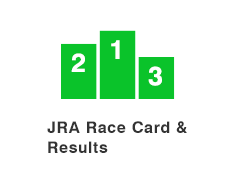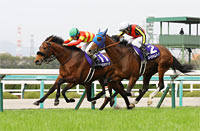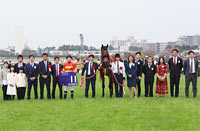Osaka Hai (G1) - Data Analysis
Top middle-distance race of the spring season brings together runners with strong credentials
After achieving his first G1 victory in the 2024 Osaka Hai, Bellagio Opera went on to deliver another strong performance in his next race, finishing 3rd in the Takarazuka Kinen. Similarly, 2024 runner-up Rousham Park finished a close 2nd in the Breeders’ Cup Turf held in the autumn season of the same year, just a neck behind the winner. In other words, the Osaka Hai not only crowns the spring middle-distance champion, but this must-watch fixture also offers valuable insights into contenders for upcoming major races in Japan and overseas. Let’s now analyze some features shared by successful runners in this race based on results over the last 10 years, including the years through 2016—when the Osaka Hai was still held as a G2 race.
Top favorites are fairly reliable picks
Looking at performances by runners over the last 10 years in terms of favoritism, we find that runners backed as 1st, 2nd, and 4th favorite all achieved a Top 3 ratio of 60.0%. Although, runners backed as 3rd favorite struggled somewhat with a Top 3 ratio of 20%, top favorites should be rated accordingly. [Table 1]
[Table 1] Performance by favoritism (last 10 years)
| Favoritism |
Performance
[1st-2nd-3rd-4th or lower] |
Win ratio |
Top 2 ratio |
Top 3 ratio |
| 1st favorite |
2-2-2-4 |
20.0% |
40.0% |
60.0% |
| 2nd favorite |
4-1-1-4 |
40.0% |
50.0% |
60.0% |
| 3rd favorite |
0-2-0-8 |
0% |
20.0% |
20.0% |
| 4th favorite |
2-1-3-4 |
20.0% |
30.0% |
60.0% |
| 5th favorite |
0-1-0-9 |
0% |
10.0% |
10.0% |
| 6th-10th favorite |
2-3-3-42 |
4.0% |
10.0% |
16.0% |
| 11th favorite or lower |
0-0-1-41 |
0% |
0% |
2.4% |
Watch horses aged 5 or below
Looking at performances by runners over the last 10 years in terms of age, we observe that 28 of the 30 Top 3 finishers were aged 4 or 5. Meanwhile, runners aged 6 or above finished in the Top 3 only twice. This suggests that we should focus on relatively younger horses. [Table 2]
[Table 2] Performance by age (last 10 years)
| Age |
Performance
[1st-2nd-3rd-4th or lower] |
Win ratio |
Top 2 ratio |
Top 3 ratio |
| 4 |
4-4-5-30 |
9.3% |
18.6% |
30.2% |
| 5 |
6-5-4-37 |
11.5% |
21.2% |
28.8% |
| 6 |
0-1-1-24 |
0% |
3.8% |
7.7% |
| 7 |
0-0-0-13 |
0% |
0% |
0% |
| 8 |
0-0-0-6 |
0% |
0% |
0% |
| 9 |
0-0-0-2 |
0% |
0% |
0% |
The bulk of the winners have started in Brackets 3-6
Looking at performances by runners over the last 10 years in terms of bracket number, we note that eight of the 10 winners started in Brackets 3-6. In addition, runners starting in Brackets 3-6 produced several 2nd and 3rd-place finishers. In other words, we should assume this race favors runners starting near the middle brackets. [Table 3]
[Table 3] Performance by bracket number (last 10 years)
| Bracket number |
Performance
[1st-2nd-3rd-4th or lower] |
Win ratio |
Top 2 ratio |
Top 3 ratio |
| 1 |
0-2-0-12 |
0% |
14.3% |
14.3% |
| 2 |
0-0-1-13 |
0% |
0% |
7.1% |
| 3 |
2-2-1-12 |
11.8% |
23.5% |
29.4% |
| 4 |
2-1-1-14 |
11.1% |
16.7% |
22.2% |
| 5 |
2-1-2-14 |
10.5% |
15.8% |
26.3% |
| 6 |
2-2-1-15 |
10.0% |
20.0% |
25.0% |
| 7 |
1-1-3-15 |
5.0% |
10.0% |
25.0% |
| 8 |
1-1-1-17 |
5.0% |
10.0% |
15.0% |
Also check the closing speed in the previous race
Looking at performances by runners over the last 10 years by ranking in terms of the estimated time over the final three furlongs in their previous race, we find that runners that had been ranked 3rd or higher achieved a relatively strong Top 3 ratio. This suggests that top runners in terms of the estimated time over the final three furlongs in their previous race are likely to fare well in this race. [Table 4]
[Table 4] Performance by ranking in terms of estimated time over final three furlongs in previous race (last 10 years)
Estimated time over final
three furlongs in previous race |
Performance
[1st-2nd-3rd-4th or lower] |
Win ratio |
Top 2 ratio |
Top 3 ratio |
| 1st |
3-4-1-18 |
11.5% |
26.9% |
30.8% |
| 2nd |
1-2-3-13 |
5.3% |
15.8% |
31.6% |
| 3rd |
2-1-2-14 |
10.5% |
15.8% |
26.3% |
| 4th |
0-0-2-12 |
0% |
0% |
14.3% |
| 5th |
0-0-0-16 |
0% |
0% |
0% |
| 6th or lower |
3-2-2-33 |
7.5% |
12.5% |
17.5% |
Note: Runners that contested a NAR or overseas race last time out have been excluded.
Seek out the winner!
Affiliation and finish in previous race also key points to watch
The last 10 winners were all Ritto-trained and had finished 7th or higher in their previous race. Other shared features among the 10 winners were that they were aged 5 or below and that they started in Brackets 3-8. Runners that fit these trends should therefore be considered leading contenders. [Table 5]
[Table 5] Winners’ affiliation, finish in previous race, age, and bracket number (last 10 years)
| Year |
Winner |
Affiliation |
Finish in previous race |
Age |
Bracket number |
| 2015 |
Lachesis |
Ritto |
6th |
5 |
3 |
| 2016 |
Ambitious |
Ritto |
2nd |
4 |
7 |
| 2017 |
Kitasan Black |
Ritto |
2nd |
5 |
4 |
| 2018 |
Suave Richard |
Ritto |
1st |
4 |
8 |
| 2019 |
Al Ain |
Ritto |
5th |
5 |
3 |
| 2020 |
Lucky Lilac |
Ritto |
2nd |
5 |
5 |
| 2021 |
Lei Papale |
Ritto |
1st |
4 |
6 |
| 2022 |
Potager |
Ritto |
4th |
5 |
4 |
| 2023 |
Jack d’Or |
Ritto |
7th |
5 |
5 |
| 2024 |
Bellagio Opera |
Ritto |
2nd |
4 |
6 |
(Masaya Ibuki)
|


















